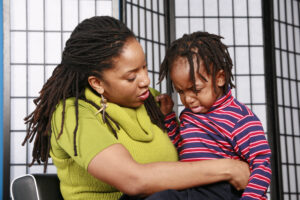
Learning to Tolerate Frustration and Delay Gratification
It’s hard to wait! It can be hard for adults, and it’s even harder for young children. Psychologist Walter Mischel and colleagues have spent decades
All relationships experience moments of miscommunication or conflicting intentions and expectations; these are known as ruptures. No matter how good a parent you are – no matter how sensitive, attuned, and attentive– ruptures between you and your child will occur now and then. In fact, Dr. Ed Tronick’s research suggests that as many as 80% of interactions between parent and infant involve those messy moments of rupture. We can’t remain continuously connected and coordinated with our young child. And when there’s a mismatch between us, we feel it, and the child does too—it does create stress. The good news is that repairing mismatch reduces stress and leads to recovery.
Repairing these ruptures during parent-infant interactions is called “interactive repair.” Interactive repair is the transition from a mis-coordinated state to a coordinated state. It’s a process of mutual regulation that involves both the infant and the parent. It requires us, of course, to recognize the rupture (what we can refer to as a “mix-up,”) acknowledge it—and our child’s feelings about it—and then take action to repair (“fix-up”), and do it differently moving forward. We can call this process “mix-up, fix-up.”
Examples of “Mix-Up, Fix-Up”
Cleo and her 3-year-old son Jack are late to meet her mother at the park. Cleo knows her mother doesn’t like to wait, but Jack is busy with his trains and when Cleo lets him know it’s time to switch gears, he bursts into angry tears and refuses to cooperate. Cleo wants to have her own meltdown, but holds it together the best she can. Just as they are about to leave the house, Jack insists on putting his shoes on himself. Imagining her mother’s impatience, Cleo yells, “It’s too late for that!” Then she grabs the shoes, scoops up her son, and without a word, marches them to the car. Thankfully, the outside air and walking calms her enough to see the situation and her son more clearly. She snuggles him as she sits him in his carseat and says, “I’m sorry I yelled at you and rushed you. I was afraid of being late. I love that you like to play and put on shoes all by yourself! Next time I’ll set a timer so we have time to get ready before we meet Nana. He touches her face gently and asks, “Can we play mama train and baby train?” Cleo replies, “Choo! Choo!” and with a laugh, they head out.
We might think repair is only for ruptures with older children, with whom you can talk it through together. But long before an infant is talking in sentences, they can appreciate your attention and attunement.
Jim is playing with 11-month-old Erica and enjoying intimate, playful synchrony. An alert on Jim’s phone distracts him and he becomes unaware of Erica, who grows more and more upset. To repair the rupture, Jim brings full attention back to his distressed baby and acknowledges what happened: “I got distracted and you were sad. I’m here now.” After realizing this can happen frequently, he creates a new habit for whenever he sets aside time to play with Erica in her room: Jim adjusts the alerts on his phone and places it on the shelf by her door.
Over time, successful repairs between you and your child will strengthen your relationship, and your child will develop emotional resilience and trust. According to Dr. Tronick, “When you reconnect, there is a chance you and your infant will develop something new. You figure out a new way to do something together that you have never done before. If you create something new, you grow. And babies are about growing.” The child is learning through these experiences!
Through the repair process of mix-up, fix-up, your child learns:
And your child also develops:
We parents learn from the repair process, too! We learn:
It’s important to remember that parenting your child through the daily ups and downs is hard, and parenting can bring up painful memories and feelings from your own childhood. It can help to talk to another adult, even a trusted friend, to help you sort out your feelings and see things more clearly.

It’s hard to wait! It can be hard for adults, and it’s even harder for young children. Psychologist Walter Mischel and colleagues have spent decades

Young children must find their own space and place – physically and emotionally – in their homes and in the world. To do this, they

Almost 50 years ago, researchers Alexander Thomas and Stella Chess studied 100 babies from early infancy to adulthood and identified 9 temperament traits, including persistence,

As parents, we get so much feedback about what we can do to enhance our baby’s development. Sometimes, it can be difficult to remember one

Children thrive when they are provided with a predictable, structured environment. Routines provide a sense of safety and security, as well as foster healthy emotional and

Just think of how much time babies spend in routines of one kind or another: sleeping, bathing, feeding, and diaper changing, not to mention dressing,

An excerpt from a behind-the-scenes interview with Dr. Kathy Hirsh-Pasek at the 2018 Simms/Mann Institute Think Tank

As parents, we get so much feedback about what we can do to enhance our baby’s development. Sometimes, it can be difficult to remember one
| Cookie | Duration | Description |
|---|---|---|
| __stripe_mid | 1 year | Stripe sets this cookie cookie to process payments. |
| __stripe_sid | 30 minutes | Stripe sets this cookie cookie to process payments. |
| cookielawinfo-checkbox-advertisement | 1 year | Set by the GDPR Cookie Consent plugin, this cookie is used to record the user consent for the cookies in the "Advertisement" category . |
| cookielawinfo-checkbox-analytics | 11 months | This cookie is set by GDPR Cookie Consent plugin. The cookie is used to store the user consent for the cookies in the category "Analytics". |
| cookielawinfo-checkbox-functional | 11 months | The cookie is set by GDPR cookie consent to record the user consent for the cookies in the category "Functional". |
| cookielawinfo-checkbox-necessary | 11 months | This cookie is set by GDPR Cookie Consent plugin. The cookies is used to store the user consent for the cookies in the category "Necessary". |
| cookielawinfo-checkbox-others | 11 months | This cookie is set by GDPR Cookie Consent plugin. The cookie is used to store the user consent for the cookies in the category "Other. |
| cookielawinfo-checkbox-performance | 11 months | This cookie is set by GDPR Cookie Consent plugin. The cookie is used to store the user consent for the cookies in the category "Performance". |
| CookieLawInfoConsent | 1 year | Records the default button state of the corresponding category & the status of CCPA. It works only in coordination with the primary cookie. |
| elementor | never | This cookie is used by the website's WordPress theme. It allows the website owner to implement or change the website's content in real-time. |
| viewed_cookie_policy | 11 months | The cookie is set by the GDPR Cookie Consent plugin and is used to store whether or not user has consented to the use of cookies. It does not store any personal data. |
| Cookie | Duration | Description |
|---|---|---|
| mailchimp_landing_site | 1 month | The cookie is set by MailChimp to record which page the user first visited. |
| Cookie | Duration | Description |
|---|---|---|
| _ga | 2 years | The _ga cookie, installed by Google Analytics, calculates visitor, session and campaign data and also keeps track of site usage for the site's analytics report. The cookie stores information anonymously and assigns a randomly generated number to recognize unique visitors. |
| _gat_gtag_UA_46801669_2 | 1 minute | Set by Google to distinguish users. |
| _gid | 1 day | Installed by Google Analytics, _gid cookie stores information on how visitors use a website, while also creating an analytics report of the website's performance. Some of the data that are collected include the number of visitors, their source, and the pages they visit anonymously. |
| tk_lr | 1 year | The tk_lr is a referral cookie set by the JetPack plugin on sites using WooCommerce, which analyzes referrer behaviour for Jetpack. |
| tk_or | 5 years | The tk_or is a referral cookie set by the JetPack plugin on sites using WooCommerce, which analyzes referrer behaviour for Jetpack. |
| tk_r3d | 3 days | JetPack installs this cookie to collect internal metrics for user activity and in turn improve user experience. |
| tk_tc | session | JetPack sets this cookie to record details on how user's use the website. |
| Cookie | Duration | Description |
|---|---|---|
| cookies.js | session | No description available. |
| m | 2 years | No description available. |